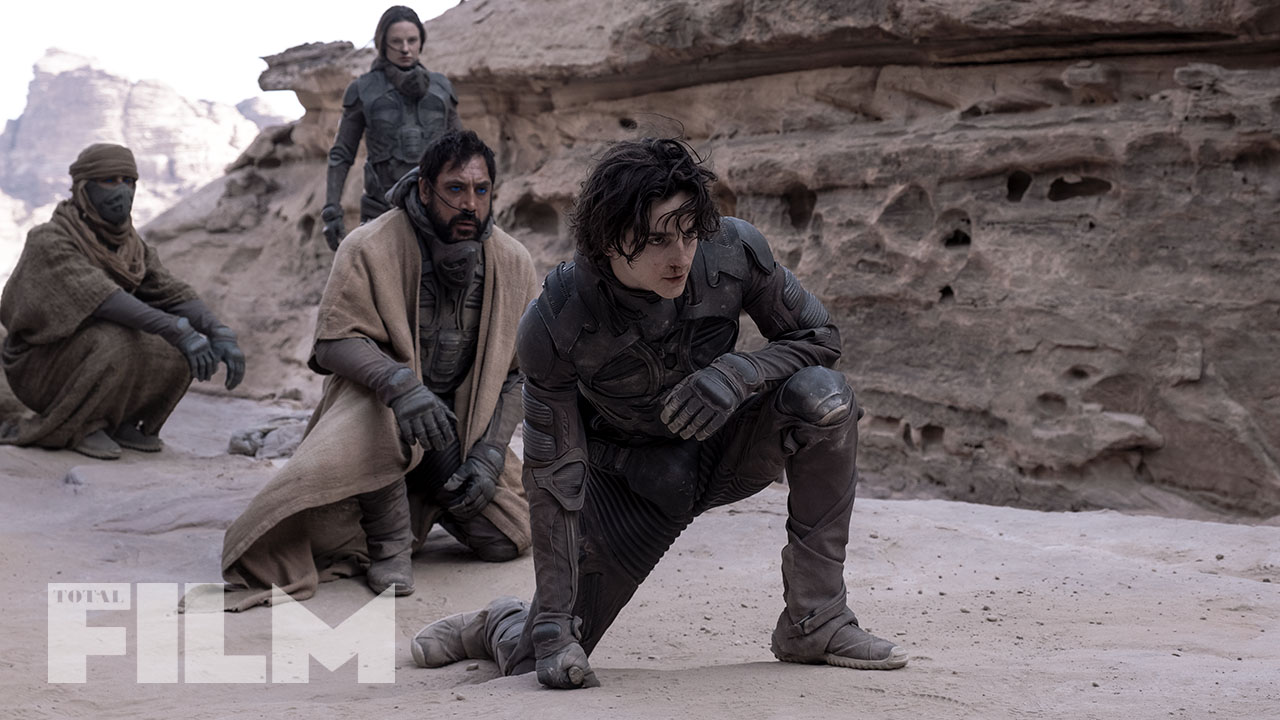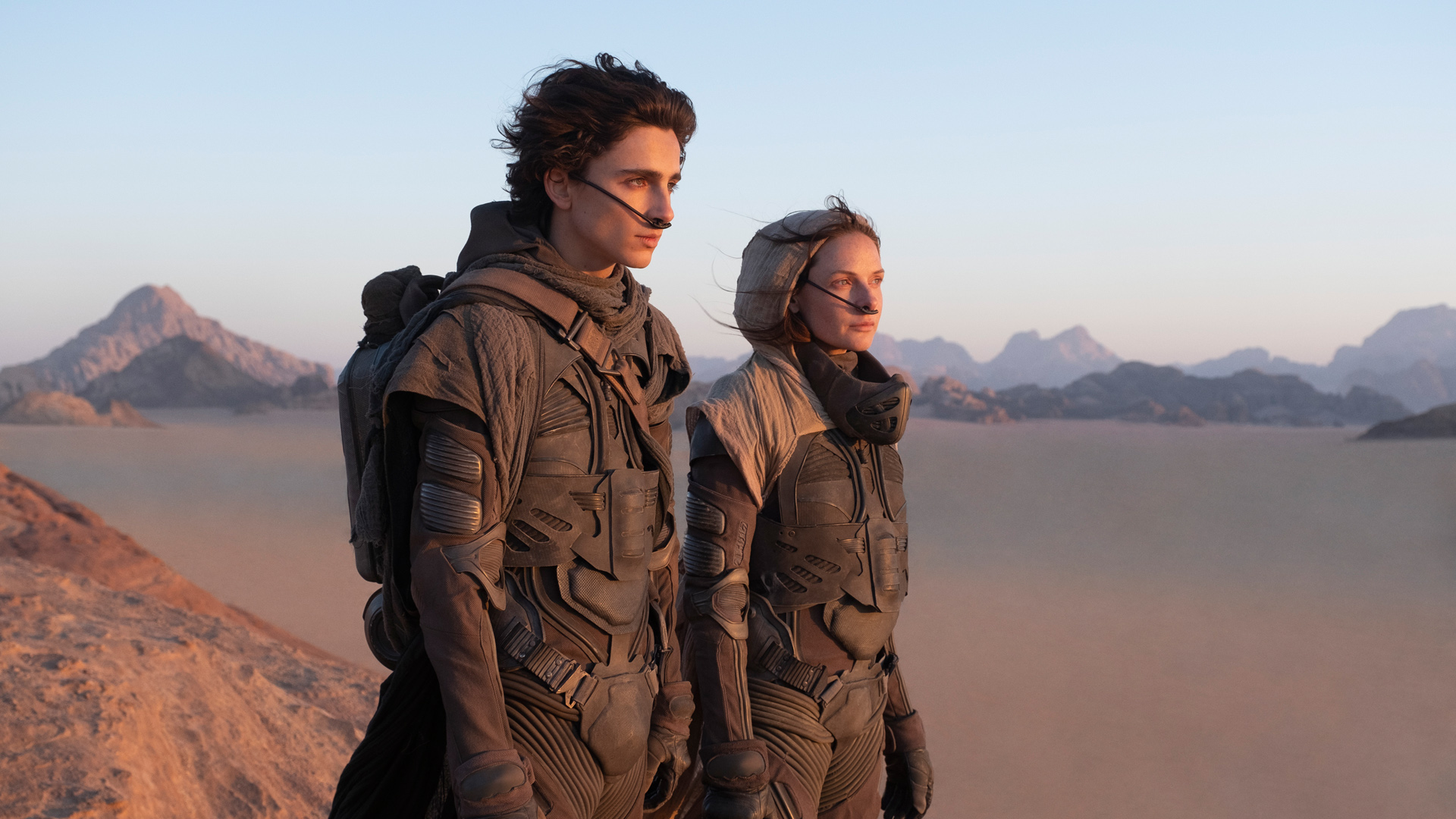GamesRadar+ Verdict
An astounding spectacle, vast in scale and ambition. Prepare to have your breath snatched away.
Why you can trust GamesRadar+
"This is only the beginning," remarks Zendaya’s desert warrior Chani towards the end of Denis Villeneuve’s take on Frank Herbert’s colossal 1965 sci-fi novel Dune. Those words alone should thrill fans, for Villeneuve wisely does not try to cram all of Herbert’s hefty tome into his two-and-a-half-hour running time – a lesson clearly learned from David Lynch’s much-maligned 1984 effort. Given the care and attention paid to setting up this intergalactic adventure, there’s no need to rush.
Like his last two movies, Arrival and Blade Runner 2049, Villeneuve’s third sci-fi in a row is jaw-dropping in its invention and boldness. While the film will play on small screens via Warner’s HBO Max streaming channel in some territories, there can be no doubt, you’ll be doing yourself – and Villeneuve’s film – a huge disservice if you see this on anything but the biggest screen you can find.
The year is 10191. Duke Leto Atreides (Oscar Isaac), of the powerful House Atreides, is assigned to be the fief ruler of Arrakis. A sparse desert-scape that makes Tatooine look positively inviting, this Sahara-like planet just happens to be the source of melange – a powerful drug also known as ‘spice’. A sacred hallucinogen that can even prolong life, it has become regarded as one of the most valuable substances in the universe.
Mining ‘spice’ is hazardous, with Arrakis plagued by dangerous giant sandworms that grow up to 400 meters in length, living beneath the arid surface as they hunt for food. But that’s not enough to stop Leto, who takes his son Paul (Timothée Chalamet) and his concubine Lady Jessica (Rebecca Ferguson) to the planet. With them comes the battle-hardened Gurney Halleck (Josh Brolin) and hot-shot pilot Duncan Idaho (Jason Mamoa).

The young Paul must take on the mantle of becoming his father’s successor, but it’s no easy path. Early on, the witch-like ‘Truthsayer’ Gaius Helen Mohiam (Charlotte Rampling, her face obscured) subjects Paul to inordinate pain by instructing him to place his hand inside a simple-looking box. He passes, in what will be the first of many tests; this is a coming-of-age story played out against the most hostile of backdrops.
In a story that deals with loyalty and betrayal, Dune also blends the personal with the political, as House Atreides face the machinations of the rival House Harkonnen that previously managed the spice harvesting. Stellan Skarsgård’s hideous slug-like Baron Vladimir Harkonnen is a superb antagonist, part Jabba the Hutt, part Colonel Kurtz in Apocalypse Now, as he plots the downfall of Leto and his clan with a violent and bloody coup.
Co-scripted by Villeneuve with Eric Roth (A Star is Born) and Jon Spaihts (Doctor Strange), this sprawling adaptation only barely has time to introduce us to the Freman, the oppressed native people of Arrakis to which Zendaya’s Chani and Javier Bardem’s chief Stilgar belong. With their eyes bright blue due to exposure to ‘spice’, they’re a distinct-looking group who understand Arrakis more than most.
As absorbing as Dune’s plot is, it’s the world-building that will leave your mind blown. The costumes, the production design and the visual effects are all elite-level, perfectly harnessed to bring Villeneuve’s vision of Herbert thrillingly alive. From the suits used to recycle the body’s moisture in the desert to the helicopters with rotor-blades that flutter like mosquito wings, this is science fiction to get utterly lost in.
No doubt, some will carp that the film stops at the notional halfway point, building less to a climax than to anticipation for Paul’s journey in the second half of the book. Some characters are also given little space to flourish, like Dave Bautista’s Harkonnen ally Glossu ‘Beast’ Rabban, although the Guardians of the Galaxy star makes a sizeable impression when he does appear.
Yet there’s so much to admire. The enormous sets by Patrice Veremette, beautifully photographed by Director of Photography Greig Fraser, truly transport you to both the faraway future and, improbably, the near past. Villeneuve’s Dune feels like a film that pays homage to the 1960s era of sci-fi that Herbert’s book helped define; the shadow of Stanley Kubrick’s 2001: A Space Odyssey looms large.
Amid a very fine ensemble, Chalamet stands tall, shouldering what is clearly his most mature role to date. His journey from young boy to adult is the heart of Dune, and it’s something the actor embraces wholeheartedly. A word too for Sharon Duncan-Brewster, who impresses greatly as Freman ecologist Dr. Liet Kynes – gender-swapped from the book and previous screen incarnations.
In the end, it’s not the performances so much that you’ll remember as the universe that surrounds them. When the sandworm makes its inaugural appearance, you’ll have a genuine OMG moment, in what is surely the most remarkable scene you’ll see in cinema all year. Pray that Villeneuve is granted a chance to continue the story, because his Dune is the adaptation fans have waited a generation for.
Dune is out in cinemas and on HBO Max in the US from October 22, 2021. In the meantime, catch up with all the most exciting upcoming movies heading your way.
More info
| Genre | Action |
James Mottram is a freelance film journalist, author of books that dive deep into films like Die Hard and Tenet, and a regular guest on the Total Film podcast. You'll find his writings on GamesRadar+ and Total Film, and in newspapers and magazines from across the world like The Times, The Independent, The i, Metro, The National, Marie Claire, and MindFood.




